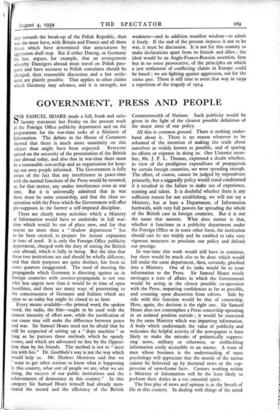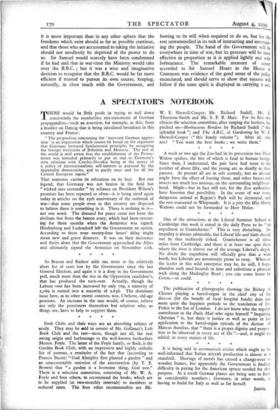GOVERNMENT, PRESS AND PEOPLE
IR SAMUEL HOARE made a full, frank and satis- factory statement last Friday on the present work of the Foreign Office publicity department and on the preparations for the war-time tasks of a Ministry of Information. The debate in the House of Commons showed that there is much more unanimity on this subject than might have been expected. Everyone agreed on the necessity of the presentation of the British case abroad today, and also that in war-time there must be a reasonable censorship and an organisation for keep- ing our own people informed. The Government is fully aware of the fact that any interference in peace-time with the normal functions of the Press would be resented, or, for that matter, any undue interference even in war dine. But it is universally admitted that in war there must be some censorship, and that the close co- operation with the Press which the Government will offer pre-supposes in the former a self-imposed discipline.
There are clearly many activities which a Ministry of Information would have to undertake in full war- time which would be out of place now, and for that reason no more than a " shadow department " has so far been created, to prepare for instant expansion in time of need. It is only the Foreign Office publicity department, charged with the duty of stating the British case abroad, which is fully in being. But the idea that these two institutions are and should be wholly different, and that their purposes are quite distinct, has been in some quarters exaggerated. The need of meeting the propaganda which Germany is directing against us in foreign countries with counter-propaganda is not one whit less urgent now than it would be in time of open hostilities, and there are many ways of penetrating to the consciousness of Germans and Italians which are open to us today but might be closed to us later.
Every means available—the printed word, the spoken word, the radio, the film—ought to be used with the utmost intensity of effort now, while the justification of our cause may still make the difference between peace and war. Sir Samuel Hoare need not be afraid that he will be suspected of setting up a " dope machine " as long as he pursues those methods which he openly avows, and which are advocated no less by the Opposi- tion than by his friends. The method is not to " meet lies with lies." Dr. Goebbels's way is not the way which would help us. Mr. Herbert Morrison said that we " want to get other nations to know what is happening in this country, what sort of people we are, what we are doing, the success of our public institutions and the achievements of democracy in this country." In this category Sir Samuel Hoare himself had already men- tioned the record and the efficiency of the British Commonwealth of Nations. Such publicity would be given in the light of the clearest possible definition of the major aims of our policy.
All this is common ground. There is nothing under- hand about it. There is no reason whatever to be ashamed of the intention of making the truth about ourselves as widely known as possible, and of sparing no efforts or expense in doing so. One Unionist mem- ber, Mr. J. P. L. Thomas, expressed a doubt whether, in view of the prodigious expenditure of propaganda by certain foreign countries, we were spending enough. The effort, of course, cannot be judged by expenditure primarily, but a niggardly policy would stand condemned if it resulted in the failure to make use of experience, training and talent. It is doubtful whether there is any sufficient reason for not establishing, we will not say a Ministry, but at least a Department, of Information forthwith, with very full powers for spreading the whole of the British case in foreign countries. But it is not the name that matters. What does matter is that, whether it functions as a publicity department under the Foreign Office or in some other form, the institution should cast its net widely and be enabled to take very vigorous measures to proclaim our policy and defend our prestige.
In war-time this work would still have to continue, but there would be much else to be done which would fall under the same department, then, certainly, glorified into a Ministry. One of its tasks would be to issue information to the Press. Sir Samuel Hoare wisely envisages a state of affairs in which the Government would be acting in the closest possible co-operation with the Press, imparting confidences as far as possible, and counting upon discretion from editors. Side by side with this function would be that of censorship. Here, again, the decision is the right one. Sir Samuel Hoare does not contemplate a Press censorship operating in an isolated position outside ; it would be exercised by the same Ministry which was imparting information. A body which understands the value of publicity and welcomes the helpful activity of the newspapers is least likely to make the mistake of pedantically suppres- sing news, military or otherwise, or withholding information easily accessible to an enemy. A team of men whose business is the understanding of mass psychology will appreciate that the morale of the nation cannot be bolstered up by doctored news or the sup- pression of unwelcome facts. Censors working within a Ministry of Information will be the least likely to perform their duties in a too censorial spirit.
The free play of news and opinion is as the breath of life in this country. In dealing with things of the mind it is more important than in any other sphere that the freedoms which exist should as far as possible continue, and that those who are accustomed to taking the initiative should not needlessly be deprived of the power to do so. Sir Samuel would scarcely have been condemned if he had said that in war-time the Ministry would take over the B.B.C. ; but it was a wise and imaginative decision to recognise that the B.B.C. would be far more efficient if trusted to pursue its own course, keeping, naturally, in close touch with the Government, and bowing to its will when required to do so, but for the rest untrammelled in its task of instructing and entertain_ ing the people. The hand of the Government will be everywhere in time of war, but its pressure will be most effective in proportion as it is applied lightly and with forbearance. The remarkable measure of assent accorded to Sir Samuel Hoare in the House of Commons was evidence of the good sense of the policy enunciated, and should serve to show that success will follow if the same spirit is displayed in carrying it out.









































 Previous page
Previous page